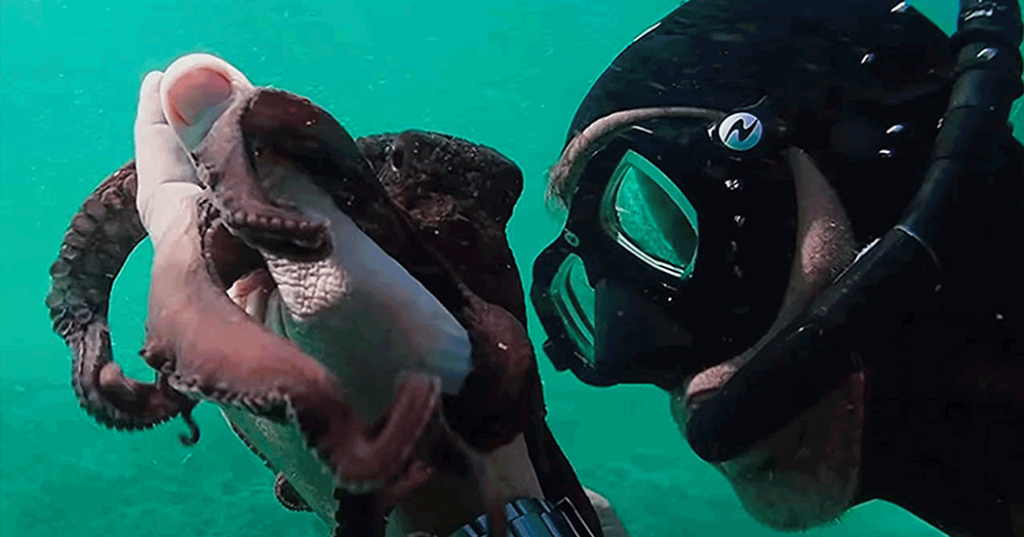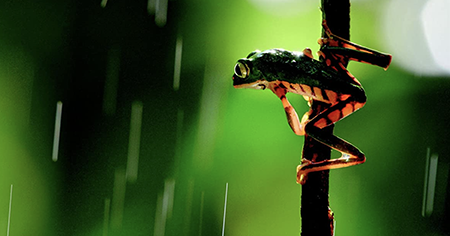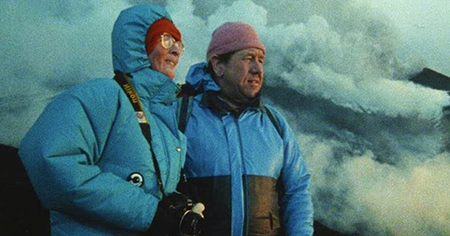ALSO ON CINELUXE
Sign up for our monthly newsletter
to stay up to date on Cineluxe
This Oscar-nominated Netflix documentary is relentlessly self-obsessed but still worth watching for its nature footage
by Dennis Burger
April 6, 2021
Netflix’ My Octopus Teacher tells the story of Craig Foster, a South African director/cinematographer who, in the midst of a midlife crisis of sorts, commits to free-diving in the kelp forests near Cape Town every day to get his head together or whatever. During his dives, he quickly befriends a common octopus (Octopus vulgaris) and becomes obsessed with her life and daily habits.
Your enjoyment of the film will likely largely come down to whether or not you like Foster as a human being, because he not only narrates the film from beginning to end in the form of one continuous monologue but the footage often cuts to him sitting at a table, staring about three inches to the left of the camera, telling his tale Spalding Gray style.
He may be a perfectly fine man. I don’t know him. But he exhibits so many infuriating quirks that I found myself struggling to connect with him. He has an annoying habit shared by all emotionally distant people, in that he often refers to himself in the second person, present tense. So, “I realized” becomes “You realize,” and “I rushed to the surface as fast as I could” becomes “You rush to the surface as fast as you can.”
Far too often, when there’s the perfect opportunity to focus on the amazing underwater imagery of the octopus, we instead cut to Foster for absolutely no reason. He also almost never shuts up—except for a few shots where he stares into the camera and gulps pensively to let us know that it’s time to have an emotion. Shots that absolutely speak for themselves are narrated like a bad audio commentary from the early days of Laserdisc and DVD, when directors hadn’t figured out yet that they can occasionally stop talking if they don’t have anything interesting to say.
But those are pet peeves and don’t speak to the quality of My Octopus Teacher as a film. Here, too, I have some concerns, though. Most of the footage for this ostensibly nonfiction film was shot over the course of many months, and much of it was captured via handheld underwater cameras. In the process of stitching together a reasonably linear narrative, it’s obvious a lot of editorializing was done, which is totally fine. The problem comes from the fact that sometimes this editorializing feels far too forced.
At one point, for example, Foster’s octopus friend loses an arm in a shark attack. That in itself provides an opportunity to watch the fascinating process of her regrowing the arm over time. But since the narrative thread the filmmakers settled on centers on all the lessons Foster learned from the octopus, he of course has to concoct some hackneyed fable about how if this cephalopod could heal such a catastrophic wound, he could find a way to crawl out of his funk and hang out with his son. To call this a stretch would be to test the limits of elasticity.
About a quarter of the way into My Octopus Teacher, I really started to become distracted with the artifice of it all. And I say that as someone who is infatuated with David Attenborough’s world-spanning documentaries, many of which rely on footage that’s practically staged.
The difference is that Attenborough’s series don’t present themselves as personal journeys. My Octopus Teacher does. Foster tells the tale of his treks into the kelp forest as if no one else in the world existed, not even his family. The fact that he’s alone, that this is a solitary endeavor, is half the point of the narrative. And indeed, a lot of the best footage comes directly from his hand.
But then we’ll cut to a shot of him, underwater, holding his camera, which rightly raises the question: Wait, who’s filming that footage? There are also long top-down drone shots of Foster entering the ocean, which further undermines the integrity of the yarn he’s spinning about being oh-so-alone during this stretch of time.
So you’re probably wondering why I still recommend watching My Octopus Teacher despite all its problems. That simply comes down to the fact that Foster managed to capture some of the most compelling and fascinating footage I’ve ever seen of the daily life of an octopus. We get to see her hunting, hiding, and healing. We get to watch her study Foster as curiously as he studies her. But my favorite shot by far is a sequence in which Foster catches her playing, entertaining herself, staving off boredom. I wish he hadn’t intruded on this footage with his obvious observations about what she’s doing, because it’s clear to anyone with eyes. But there’s nearly literally nothing Foster could have done to diminish the value of this imagery.
And there are so many other shots throughout the film that have the same impact. Far too many documentaries about cephalopods focus on animals in captivity. Here we have the opportunity to see this magnificent alien creature in her natural habitat, and I only wish I could think of a word more poignant than “revelatory” to describe my reaction to it all.
Granted, not all of that footage is what you would describe as home-cinema reference quality. The most compelling of it is more than a bit raw, kinda dingy, questionably lit, and obscured by silt. This is interspersed with much more professionally shot footage and the aforementioned indoor interview shots of Foster. But given that so much of the video is so unpolished, it’s not surprising that Netflix’ presentation wasn’t mastered in Dolby Vision. We just get a UHD transfer with no HDR.
Still, even just a few short years ago, such a presentation would have been riddled with banding, so it’s heartening to see that Netflix has stepped up its game in terms of delivering non-HDR video. There’s one shot near the end of a setting sun that’s a bit clipped, but other than that, I didn’t spot any noteworthy video artifacts.
The Dolby Digital+ 5.1 soundtrack, meanwhile, is dominated by Foster’s narration and the sort of new-agey score we’ve come to expect from nature documentaries in this vein. There’s nothing really special about it, but it serves its purpose.
When you get right down to it, though, the soundtrack could have consisted of Gilbert Gottfried reading 50 Shades of Grey and I still would have suffered through My Octopus Teacher enthusiastically and with roughly the same level of frustration. You stick the word “octopus” in the title of a documentary and I’m going to watch it, just on the off chance of seeing these enigmatic beings behaving in mysterious ways I’ve never witnessed before. This one delivers on that in spades, and I imagine I’ll be watching it again sometime very soon. The next time I do, though, I think I might mute the soundtrack and cue up Pink Floyd’s Meddle on a loop in the background instead.
Dennis Burger is an avid Star Wars scholar, Tolkien fanatic, and Corvette enthusiast who somehow also manages to find time for technological passions including high-end audio, home automation, and video gaming. He lives in the armpit of Alabama with his wife Bethany and their four-legged child Bruno, a 75-pound American Staffordshire Terrier who thinks he’s a Pomeranian.
PICTURE | Aside from a shot near the end of a setting sun that’s a bit clipped, the UHD presentation, sans HDR, exhibits no noteworthy artifacts
SOUND | The purely utilitarian Dolby Digital+ 5.1 soundtrack is dominated by narration and the sort of new-agey score we’ve come to expect from nature documentaries in this vein.
© 2023 Cineluxe LLC






